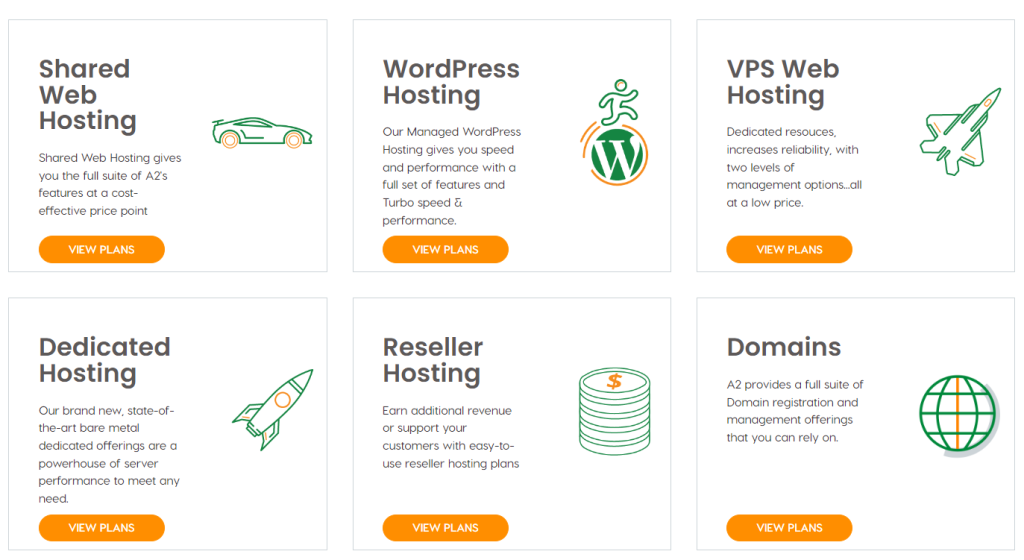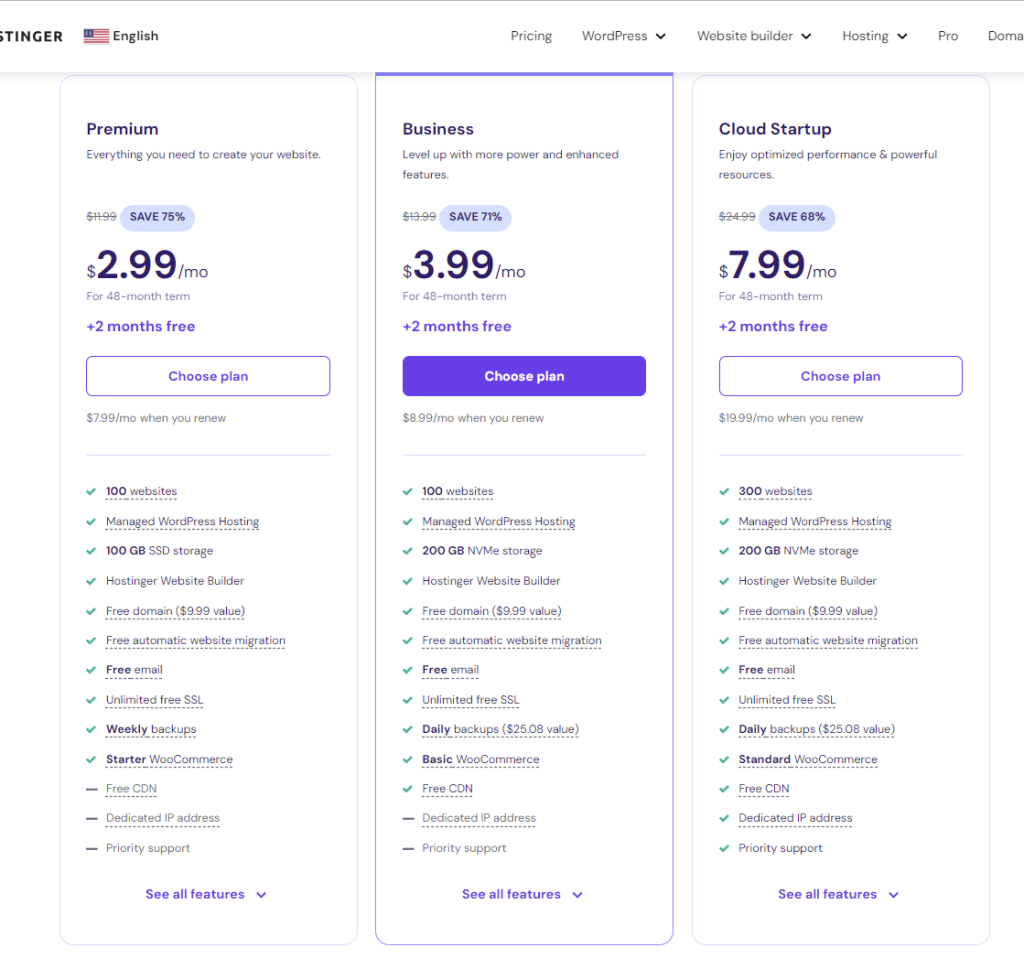SiteGround provides convenient hosting solutions for users. However, considering the best SiteGround alternatives is worth considering if you want affordable hosting providers with advanced features and management capabilities.
These alternative services offer exceptional performance, reliable customer support, and affordable pricing like SiteGround. They have user-friendly interfaces and intuitive designs, making it easy for beginners with no tech skills to navigate and customize their websites seamlessly.
So, if you want the best affordable alternative to SiteGround with excellent hosting features, explore these SiteGround competitors for your website needs.
To know more about SiteGround, you should check out this detailed SiteGround hosting review.
This article will analyze the following SiteGround competitors:
| Best SiteGround Alternatives | Starting Price Plans |
| Bluehost | $2.95 |
| Cloudways | $11:00 |
| A2 Hosting | $1.95 |
| HostGator | $3.75 |
| DreamHost | $2.59 |
| GreenGeeks | $2.95 |
| Hostinger | $2.99 |
Table of Contents
ToggleBest Siteground alternatives summary
I’ve reviewed the seven best alternative hosting providers to SiteGround to help you make an informed decision.
The summary:
- Bluehost is a reliable hosting provider with a user-friendly interface and vital uptime.
- Cloudways offers highly scalable cloud-based hosting, allowing users to manage multiple websites easily.
- A2 Hosting focuses on speed and performance, providing solid hosting options with SSD storage.
- HostGator offers flexible plans and good customer support, making it suitable for beginners.
- DreamHost is known for its commitment to privacy and offers feature-rich hosting solutions.
- GreenGeeks stands out for its eco-friendly approach and reliable hosting services.
- Hostinger provides affordable hosting plans and a range of helpful features.
Each hosting provider has strengths and weaknesses. So read on to get insights to help you make an informed decision.
7 Best SiteGround Alternatives
Below are the seven best SiteGround alternatives:
- Bluehost
- Cloudways
- A2 Hosting
- HostGator
- DreamHost
- GreenGeeks
- Hostinger.
We’ll explore these web hosting alternatives to see what makes each hosting platform unique and the best alternative to SiteGround
1. Bluehost

Bluehost is a remarkable platform for your website hosting needs. I hosted my first blog on Bluehost until I sold it a few years ago.
The web hosting platform is a highly recommended option for beginners who are starting with WordPress. It offers affordable pricing, reliability, security, and an impressive set of WordPress features that cater well to those new to web hosting. The hosting service provider makes it easy to get your website up and running without hassle.
Bluehost offers:
- Automatic WordPress installs.
- A comprehensive marketing package.
- A WordPress staging solution.
- Free SSL certificates and Cloudflare CDN.
Bluehost does have its drawbacks, such as the lack of free automatic backups and average customer support. However, it is a good option for many users as the hosting tool provides an easy 1-click installation process. This is one of the many reasons WordPress.org officially recommends it.
If you’re considering Bluehost as an alternative to SiteGround, expect a beginner-friendly interface and a solid focus on WordPress website creation.
Like its SiteGround competitor, Bluehost offers various hosting options:
- Four shared hosting plans for WordPress users and online store owners.
- Three VPS hosting plans.
- Three dedicated servers.
- Two WooCommerce hosting plans.
Bluehost Pricing plans
Bluehost offers competitive pricing plans, with the introductory price starting at just $2.95 per month. The platform’s recommended ‘Choice Plus’ plan is $5.45 monthly. These prices make it an affordable choice if you’re on a tight budget.

Bluehost’s pros and cons
This is what I like and dislike about Bluehost.
Pros/advantages of Bluehost:
- Impressive WordPress features that make it ideal for beginners.
- Robust emphasis on security.
- Free staging environment specifically for WordPress.
- Free domain for the first year.
- Free SSD storage system for all shared hosting plans.
- Supports PHP7, HTTP/2, and NGINX Caching for improved performance.
- 1-click WordPress installation.
- No-cost Content Delivery Network (CDN) and SSL certificate.
Cons/disadvantages of Bluehost:
- It does not provide free automatic backups.
- Aggressive upselling tactics.
- Mediocre customer support.
- Limited storage and resource allocation.
How does Bluehost compare to Siteground?
Many web host users prefer Bluehost because of its affordability. I consider it the best alternative to SiteGround due to its lower cost and basic plan, which contains all the features you need to run your simple website effectively.
However, SiteGround offers superior performance and advanced caching technologies, making it the preferred choice for websites that prioritize speed and reliability.
Check out my detailed review of Sitegrund vs Bluehost.
2. Cloudways hosting

Cloudways is a leading managed cloud hosting provider with impressive features similar to SiteGround.
The website hosting platform offers exceptional performance and speed through its advanced caching system and server optimizations. It has a state-of-the-art infrastructure that provides lightning-fast load times and an excellent user experience.
The platform offers unlimited SSD storage and bandwidth on all plans.
Many website owners consider Cloudways hosting exceptional as they provide managed cloud hosting on popular cloud infrastructure providers like:
- Vultr
- Linode
- Google Cloud
- DigitalOcean
- Amazon Web Services (AWS).
The availability of options allows you to choose a preferred cloud infrastructure provider while benefiting from Cloudways’ easy-to-use interface and robust features. The web hosting provider also offers free SSL certificates, ensuring website security.
You can see their hosting services in the screenshot below:

Cloudways has data centers in multiple regions worldwide, including North America, Europe, and Asia (Singapore). So you can choose the location that best suits your target location.
Cloudways pricing plans
The hosting solution provider offers flexible pricing packages such as pay-as-you-go without a long-term commitment.
Cloudways is an easily scalable cloud hosting solution with a starting price of $11 monthly. However, you can start using the host on a free trial (no credit card required) and upgrade at your convenience.

Although the hosting provider lacks a domain registration portal and email hosting, it compensates for this with its unbeatable performance, affordability, and scalability.
If you prioritize speed and performance, Cloudways’ higher-tier plans provide additional optimizations and features to improve your website’s loading time.
Cloudways pros and cons
Here are some advantages and disadvantages of Cloudways hosting.
Cloudways hosting Pros
- Exceptional performance & speed.
- Resource scalability helps you handle sudden spikes or drops in traffic.
- Multiple cloud provider options.
- Server optimization with SSD-based storage, varnish caching, Apache and Nginx servers, and PHP-FPM configurations.
- Multiple data centers across various locations for better website performance.
- Managed security with free SSL certificates, regular OS patches, firmware upgrades, and built-in firewalls.
Cloudways cons
- No email hosting: This may not be a significant disadvantage for some users who prefer to use specialized email hosting providers like Google Workspace or Microsoft 365. However, it can be inconvenient for others who favor an all-in-one solution.
- Pricing structure: The pricing structure can be a downside for smaller websites or startups with limited budgets. The costs can increase with a sudden spike in website traffic or resource usage.
- Potential learning curve: Cloudways aims to simplify the hosting experience for its users. However, those unfamiliar with the platform may need time to get acquainted with its features and functionality.
How does Cloudways compare to Siteground?
Cloudways offers great scalability and flexibility with its cloud hosting solutions; however, SiteGround’s shared hosting plans provide a user-friendly experience and exceptional customer support.
SiteGround’s integrated caching and optimized server setup also contribute to superior performance compared to Cloudways.
3. A2 Hosting

A2 Hosting is a well-known independent shared hosting provider similar to SiteGround. The hosting is affordable and provides impressive performance, especially on its Turbo web hosting plans.
Its turbo plans include the following speed and performance resources:
- LiteSpeed server, Apache’s speed-enhanced web server alternative, which accelerates page loading time up to 20x faster.
- HTTP/3, the new web standard providing faster speed and reliable connections.
- Non-volatile memory express (NVMe) that offers 3x faster speed.
- The edge side includes (ESI) which lets you quickly designate portions of pages you want cached.
- Quick UDP internet connection (QUIC) which is TCP’s speed-enhanced alternative that lowers latency.
- SSD storage and unlimited storage and bandwidth.
These features give you:
- 99.9 uptime.
- 20x faster page loading.
- 40% faster CPU processor.

Despite these features, A2 Hosting remains much more cost-effective than SiteGround and offers unlimited storage and bandwidth on all plans, besides the Ignite package.
Other notable features of A2 Hosting are:
- Free SSL certificates.
- Staging sites.
- Multiple data centers.
- Cost-effective hosting plans.
The hosting provider offers various hosting services, including WooCommerce, Shared web hosting, WordPress hosting, etc.

A2 Hosting pricing packages
The pricing starts at a considerable $1.95 monthly. However, consider the Turbo Velocity plan if you prioritize fast loading time. This plan allows you to host unlimited websites and delivers superior performance due to its remarkable website enhancement features.

A2 Hosting pros and cons
Pros:
- Competitive pricing starting at $1.95 monthly.
- Free website migration that saves you time and effort when transferring your website to A2 hosting platform.
- Blazing-fast performance from their high-speed hosting servers.
- Uptime reliability of up to 99.9% uptime guaranteed, meaning your websites will be accessible to visitors almost always.
- Unlimited SSD storage and data transfer for all your files, databases, and emails, allowing you to scale without worrying about storage limitations.
- Developer-friendly features that make it suitable for developers and programmers.
- 24/7 customer support through various channels, including live chat, phone, and ticket-based systems, ensuring assistance whenever needed.
Cons of A2 Hosting:
- Limited resources on lower-tier plans, which may restrict resource allocation and limit scalability for high-traffic websites.
- Less intuitive user interface: The A2 Hosting control panel (cPanel) might be overwhelming for beginners or users unfamiliar with hosting management, possibly requiring a learning curve.
- Their most efficient speed-boosting features, Turbo Boost and Turbo Max, are only available on higher-tier plans, excluding shared hosting plans.
- While A2 Hosting offers automated backups, they charge an additional fee to restore your data from those backups.
How does A2 Hosting compare to Siteground?
I love A2 Hosting for its speed optimization and developer-friendly features. Nonetheless, SiteGround surpasses A2 Hosting in terms of server response time and loading speeds, thanks to SiteGround’s robust infrastructure and proactive server monitoring system.
4. HostGator

HostGator web hosting is another good alternative to SiteGround. The platform provides lower hosting prices and unlimited resources compared to SiteGround. HostGator also includes a free domain name, which adds to its overall value.
The web hosting company offers multiple hosting services, such as:
- Shared hosting.
- WordPress hosting.
- eCommerce hosting.
- Dedicated hosting.
- Reseller hosting.
Some noteworthy features of HostGator include:
- Free SSL certificates.
- Free email hosting.
- A one-click WordPress installer.
- Free web migrations.
- Website builder.
- Google Workplace.
- Data centers located across the globe.
HostGator’s hosting prices
HostGator’s shared plans are the most affordable, starting at just $3.75 monthly. However, I recommend the Baby plan, priced at $4.50 per month, as it allows for additional features and tools, such as CDN, for faster load page speed. The hosting platform uses cloud architecture and offers high performance, even in shared plans.

Pros and cons of HostGator website hosting
Here are some advantages and disadvantages of the HostGator hosting platform.
HostGator Pros:
- HostGator is cost-effective; they offer affordable hosting plans that suit budget-conscious individuals or businesses.
- HostGator provides various hosting plans, including shared, VPS, and dedicated hosting, allowing you to choose your most suitable option.
- You get unlimited bandwidth and storage for most of HostGator’s hosting plans.
- HostGator has a fantastic UX; they use a user-friendly control panel, making it easy for beginners to manage their websites.
- They provide 24/7 excellent customer support through live chat, phone, and email.
- HostGator offers free website migration, simplifying transferring your websites from SiteGround or other hosting platforms to their servers.
Cons of using HostGator as an alternative to SiteGround
- HostGator is known for its aggressive upselling tactics. They often try to sell additional services and features that may be optional.
- The web hosting provider has fewer data centers than SiteGround. This may result in slower website speed for users far from the available data centers.
- Limited advanced features: The platform needs advanced features such as staging sites or automatic off-site backups.
How does HostGator compare to Siteground?
HostGator is a popular choice for its budget-friendly hosting plans and beginner-friendly features. However, SiteGround’s top-tier security measures, including its AI-powered firewall and regular malware scans, offer enhanced website protection compared to HostGator.
5. DreamHost
DreamHost is one of the six hosting companies handpicked by Syed Balkhi, WordPress dot org’s founder, as a dependable web hosting provider. Syed recommended DreamHost and others like SiteGround, Bluehost, etc, as reliable options because they offer top-notch services. I reviewed five of them and others in this article.
Like SiteGround, DreamHost has a high customer satisfaction track record and guarantees a 99.9% uptime. They have over 20 years of experience in the website hosting industry and power over 1.5 million blogs, websites, and online stores.
The platform provides user-friendly features and a range of affordable hosting plans, making DreamHost one of the top SiteGround competitors, offering compelling web hosting packages.
The web hosting site offers the following hosting services:
- Shared hosting
- VPS hosting
- Cloud hosting
- Dedicated server hosting
- WooCommerce hosting
- Managed WordPress hosting
DreamHost offers automatic WordPress updates, taking the hassle off your hands and ensuring your blog or website is up-to-date.
The company also offers WooCommerce hosting, and fully managed DreamPress plans that provide tailored support and advanced features to meet your website’s unique needs.
DreamHost pricing plans
DreamHost pricing plan starts at just $2.59 per month for its shared starter package with incredible features. One standout Dreamhost pricing feature is their impressive 97-day money-back guarantee, ensuring that you have ample time to test their services without any risk.
If you want to host multiple websites, DreamHost’s unlimited plan starts at a low $3.95 monthly subscription.

DreamHost pros and cons
What are the advantages and disadvantages of DreamHost web hosting services? DreamHost is a well-known hosting provider with many features that benefit your blog or website. However, the hosting platform has disadvantages, like its top web hosting competitors.
Pros of DreamHost:
- Reliability and performance: DreamHost offers excellent uptime and fast loading speed, ensuring your website is accessible to visitors 24/7.
- User-friendly interface: The platform’s control panel is intuitive and easy to navigate. It simplifies managing your website, installing applications, and configuring settings, making it ideal for beginners and experienced users.
- Customizable hosting plans: DreamHost offers a variety of hosting plans, including shared, VPS, cloud, and dedicated hosting. This variable hosting plan lets you choose the most suitable option. The flexibility is beneficial as your blog or website grows and requires more resources.
- Robust security features: The web hosting company provides solid security measures, like SSL certificates and automatic updates, to ensure your site is secured. These security measures are essential for safeguarding your website against cyber threats and protecting sensitive data.
- Excellent customer support: The platform’s support team is available 24/7 via live chat, email, and a ticket-based system. They are responsive, knowledgeable, and ready to assist you with any queries or technical issues.
Cons of DreamHost:
- Limited website builder: DreamHost’s website builder, called Remixer, is somewhat basic compared to other popular website builders. You may need more advanced customization options to get your desired website.
- No cPanel: The hosting provider does not use cPanel as its control panel. The lack of a cPanel might be a drawback for users accustomed to cPanel and prefer its interface and features.
How does DreamHost compare to Siteground?
DreamHost offers reliable hosting options and is known for its commitment to privacy and open-source philosophy. Nevertheless, SiteGround’s comprehensive backup system, which allows for easy restoration of website data, sets it apart from DreamHost in terms of data protection and recovery measures.
6. GreenGeeks

GreenGeeks offers green hosting or eco-friendly hosting, which involves adopting strategies to reduce the environmental impact of their hosting activities. The eco-friendly approach appeals to brands and individual marketers who value intentional consumerism.
They commit to minimizing resource wastage by leveraging renewable energy while providing affordable and reliable hosting services.
The hosting company offers five hosting plans with excellent GreenGeeks features for each plan:
- Website hosting.
- WordPress hosting.
- VPS hosting.
- Reseller hosting.
- WooCommerce hosting.
GreenGeeks uses the latest speed performance technologies to make your blog or website superfast.
They use:
- PHP 8
- LiteSpeed caching
- LiteSpeed MariaDB
- HTTP3 / Quic, etc.
GreenGeek pricing plans
The company’s eco-friendly web hosting services come with flexible pricing plans, starting at $2.95 for one website. The pro plan is $4.95 for unlimited websites and other essential applications and features.

GreenGeeks pros and cons
Some of the pros of using GreenGeeks hosting services are:
- Eco-friendly, clean environment: GreenGeeks is known for its commitment to sustainability. They invest in renewable energy sources to power their data centers and match three times their energy consumption. This approach makes the platform an environmentally friendly website hosting choice.
- Reliability and uptime: GreenGeeks guarantees a 99.9% uptime, ensuring your website or blog remains accessible to visitors. They use robust servers and redundant infrastructure to minimize downtime.
- Performance and speed: They use SSD storage, a built-in caching system, and the latest technologies to optimize site performance.
- Scalability: GreenGeeks offers scalable hosting plans, allowing you to upgrade or downgrade your hosting resources easily per your website’s needs.
- Free migration: This service allows website owners to seamlessly transfer their websites from their current hosting provider to GreenGeeks without additional cost or hassle.
- Nightly backups: The nightly backups give you peace of mind, knowing that your website data is regularly backed up and protected from potential data loss.
The cons of using GreenGeeks hosting service:
- Limited data centers: GreenGeeks has limited data centers, meaning if your target audience is primarily outside their data center regions, it might result in slightly slower website loading times.
- No Windows hosting options: GreenGeeks specializes in Linux-based hosting and provides no Windows hosting options. If you specifically need Windows hosting for your website, you will need to consider an alternative hosting provider.
- No dedicated IP with shared hosting: The company does not provide dedicated IP addresses with their shared hosting plans. You will need to upgrade to a higher-level hosting plan if you require a dedicated IP, such as SSL certificate installation.
How does GreenGeeks compare to Siteground?
Marketers praise GreenGeeks for its eco-friendly hosting solutions and commitment to sustainability. SiteGround, on the other hand, stands out with its exceptional customer support, offering 24/7 assistance through multiple channels, including live chat, phone, and tickets.
This level of support ensures that SiteGround users receive prompt help when dealing with technical issues.
7. Hostinger

Hostinger is a standout platform that is highly recommended for website hosting. The platform is amongst the six hosting companies endorsed by WordPress dot org. The platform offers the most reliable hosting services and features you need to build and manage your online presence effectively.
Many hosting providers offer regular services; however, Hostinger dazzles its users with extensive features and professional hosting tools. That is why it’s on every marketer’s top list of SiteGround alternatives.
The hosting company provides some of the most affordable hosting options and delivers high-quality, reliable service that is excellent value for your money.
One of Hostinger websites’ standout features is their exceptional loading speed. This web host uses state-of-the-art technologies and a global server network to ensure your website loads quickly and efficiently.
The hosting company offers a user-friendly control panel that makes managing your website a breeze, even for beginners and also provides a seamless UX for site visitors.
Hostinger web hosting features
The all-in-one hosting provider has many features that can’t fit into this mini-review. Nevertheless, below are just a few for your consideration:
- LiteSpeed server infrastructure: Hostinger employs the power of LiteSpeed servers to guarantee enhanced website performance and faster loading time.
- Excellent security integrations (free SSL certificate & bit-ninja security): Every Hostinger plan includes a free SSL certificate, guaranteeing the encryption of data transmitted between your website and your visitors. The Bitninja security integration provides extra protection against potential cyber threats.
- Impressive performance: Hostinger’s commitment to top-tier performance is evident through its reliable uptime and speedy server response times.
- Unlimited SSD space & bandwidth: The web hosting company offers unlimited SSD storage and bandwidth. These provisions allow you to scale your website without worrying about storage limitations or data transfer restrictions.
- Free daily & weekly data backups: Hostinger takes data protection seriously. The hosting platform offers free daily and weekly backups to ensure your precious website data is always secure.
- Reliable uptime: With Hostinger, you can trust that your website will be up and running consistently. This hosting provider boasts an impressive 99.9% uptime guarantee, ensuring that your website remains accessible to your audience at all times.
Hostinger pricing plans
Hostinger offers competitive pricing for its hosting packages and has pricing plans that cater to a wide range of needs.
However, the shared hosting option stands out, with prices starting at $2.99 monthly. The company’s most popular and recommended “Business” plan is a $3.69 monthly subscription.
In addition, you get a two-month free subscription for all plans, plus free migration. If you’ve been considering an alternative to SiteGround, Hostinger is a compelling choice. Competitors cannot beat Hostinger’s shared hosting offers.

The pros and cons of Hostinger
Pros of Hostinger website hosting services:
- Affordability: Hostinger offers budget-friendly pricing plans, making it an attractive option for individuals, small businesses, and those starting with limited budgets.
- Fast loading speed: Hostinger provides fast load speeds, contributing to better website performance and user experience.
- Extensive global coverage: The brand has a widespread global presence, with servers in multiple locations globally. This coverage helps reduce latency and gives users faster website access across different geographic locations.
- User-friendly interface: The web hosting provider provides a user-friendly control panel, simplifying managing websites, domains, and other hosting settings.
Cons of Hostinger website hosting services:
- Limited resources on entry-level plans: Hostinger’s entry-level plans might have certain limitations on resources like storage, bandwidth, or processing power. These limitations could restrict websites’ scalability with higher traffic or resource demands.
- Price renewals: The initial promotional prices offered by Hostinger might significantly increase upon renewal. The increment can lead to higher costs in the long run.
- Limited dedicated server options: Hostinger primarily offers shared and VPS hosting plans. However, their ‘Dedicated’ server options are comparatively limited. This limitation could pose a limitation for websites that require dedicated resources for optimal performance.
How does Hostinger compare to Siteground?
Hostinger offers affordable hosting plans and a user-friendly interface, making it a suitable alternative for price-conscious users. However, SiteGround’s proactive server monitoring, regular backups, and advanced server-level optimizations contribute to higher website performance and better overall reliability.
Why consider a SiteGround alternative?
While SiteGround is a reliable web hosting platform, here are some reasons you might consider alternatives.
1. pricing structures
I believe that most SiteGround users seeking an alternative are doing so because of SiteGround hosting prices.
While SiteGround offers discounted rates for the first year of their hosting plans, their renewal rates are 4X the starting price. This will take you by surprise if you don’t do enough research before choosing a web host, prompting you to consider SiteGround alternatives.
2. No free domain
Unlike many competitors (e.g., Bluehost or Hostgator), SiteGround does not offer a free domain name registration with their hosting plans. This adds an extra cost if you’re starting a new website.
3. Limited storage
SiteGround has lower storage limits compared to some competitors. For example, their entry-level shared hosting plan comes with only 10 GB of storage, which may not be enough if you want to run a big website with heavy media usage or growing data needs.
4. Limited CPU usage
SiteGround imposes CPU usage limits on shared hosting plans. Websites with spikes in traffic or resource-heavy applications may hit these limits, leading to slowdowns or potential suspensions.
5. No Windows hosting
If you need Windows-based hosting (for example, to run ASP.NET applications), it’s safe to say SiteGround isn’t the right option for you. SiteGround only offers Linux-based hosting. Hosting providers like A2 Hosting or HostGator might be better suited for these needs.
What to Look for in SiteGround Alternatives
When looking for the best alternative SiteGround competitors, you should consider several vital factors to choose the best option for your website needs.
Here are some essential elements to consider:
1. Reliability and performance
Look for a hosting provider with a proven track record of reliability and excellent performance. Consider factors such as server uptime, website speed, and load times to ensure your website will be available and responsive to visitors.
2. Scalability
Consider the future growth of your website and whether the hosting provider can accommodate increasing traffic and resource demands. Ensure the alternative allows for easy scalability through flexible hosting plans or options to upgrade resources.
3. Support and customer service
Evaluate the quality and responsiveness of the alternative hosting provider’s customer support. Consider their availability, support channels, and user reviews to ensure they offer prompt assistance.
4. Pricing and value
Compare pricing structures and hosting plans of SiteGround alternatives. Look beyond the price and evaluate the features, resources, and value you will get. Take note of any hidden fees or limitations.
5. Features and tools
Assess the alternative’s hosting features and tools, including website builders, one-click installations, security measures, backup options, and content management system compatibility. Consider which features are essential for your website’s requirements.
6. Security
Ensure the alternative hosting provider has robust security measures. Look for features such as SSL certificates, malware scanning, firewalls, and regular backups to protect your website and customer data.
7. User-friendly interface
Evaluate the control panel interface and ensure it’s user-friendly and intuitive. A well-designed control panel can simplify website management tasks.
8. Reputation and user reviews
Research the alternative hosting provider’s reputation by reading user reviews and feedback. Look for testimonials and user experiences to get a sense of the quality of their service and customer satisfaction levels.
Which SiteGround Alternative is Best for Your Website?
Many web hosting providers offer features and tools comparable to SiteGround. Some also offer unique features you might find attractive in a SiteGround alternative. Due to the industry’s competitive nature, I recommend you select a platform based on its unique and distinguishing features.
For example:
- Cloudways hosting platform is an excellent alternative if you need scalable websites, robust app integrations, and the flexibility to switch servers.
- A2 Hosting presents an ideal alternative to SiteGround if you’re looking for similar features to transition from cloud hosting to SSD storage.
- The unique feature of HostGator web hosting company is its user-friendly interface, making it ideal for beginners and non-technical users.
- DreamHost web hosting stands out with its commitment to privacy and open-source technology. The web hosting company offers solid security measures and customizable hosting options.
- If you’re seeking all-in-one hosting solutions, Bluehost is a top hosting provider that offers integrated web design and online marketing features.
- GreenGeeks is an ideal alternative if you prioritize a sustainable, eco-friendly environment and maximize its incorporation into all aspects of your business and personal life.
- Hostinger distinguishes itself through its affordable pricing, providing high-quality hosting services at budget-friendly rates compared to other hosting companies.
After reviewing these SiteGround web hosting competitors, it is challenging to determine the best SiteGround alternative. It’s essential to note that the likes and dislikes result from personal experiences and user reviews.
Choosing the best alternative hosting provider to SiteGround is based on your preferences and website requirements.
I advise you to thoroughly research and compare different hosting options and user reviews to make an informed decision.







What an in-depth review here Poulomi. Way too many bloggers consider only pricing for hosting which is a huge mistake. Site performance is a huge factor of course but excellent support is critical because problems can and will arise with hosting solutions. Prompt, skilled tech staff – and polite too – is key to get you through the hosting-side issues. Great job my friend.
Ryan
Hi Ryan,
Thank you so much for taking the time to read my blog post and leaving such a thoughtful comment! I completely agree with you – pricing is just one aspect, and considering site performance and support are equally crucial when choosing a hosting provider.
I’m glad you found the review in-depth. It’s true that having a reliable and responsive support team can make a significant difference, especially when facing hosting-related challenges. I believe it’s an essential factor that many bloggers may overlook.